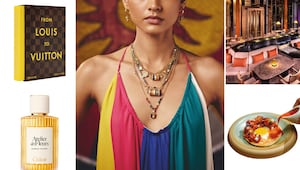" During Anne Lister's Time 'Lesbian' Was Not an Identity or a Category"
Our monthly lesbian columnist talks about how a businesswoman in the UK, re-defined female sexuality and identity—breaking norms, refusing to conform, and even having a lesbian ‘wedding’ more than a century before it was legalized.

“‘I love and only love the fairer sex, and thus, beloved by them in turn, my heart revolts for any love but theirs.’ The joy and heartbreak of watching Gentleman Jack, HBO’s eight-part TV series by Sally Wainwright, starring Suranne Jones, is a sort of a cathartic thrill. Anne Lister (1791-1840) is often described as Britain’s first modern lesbian. And a wondrous real-life account of her, living her brand of extraordinary life, is a necessary reminder of female desire, which, unlike lust, is a complex alchemy of thought and feeling.
So, while purists might describe Anne as the gender-disrupting trailblazer of the Regency-era, I’d like to believe she was actually a rather skilled seducer of women. During Anne’s time, ‘lesbian’ wasn’t the distinct identity category it’s become now. And yet, in plain sight, she was a butch woman who wore a top hat and tailored men’s clothing, was a ‘top’ in the bedroom, went by the name of Fred with many of her lovers (that included aristocracy and royalty), and even secretly married one of them. In the meantime, she also became a respectable businesswoman in Halifax. She was not a man. She simply insisted on having the same liberties as one. How she leveraged her predilection for women (and women only) to re-frame the narrative around desire and identity is more to my liking.
Gentleman Jack draws upon the secret diaries of the real Anne, who placed her legacy in 27 volumes—with 300 pages in each volume. She was definitely not the first lesbian in history, but her diaries were perhaps the earliest and the most explicit records of a woman who applied her sexual identity beyond sexual acts—heroic in her refusal to be anyone but herself, refusal to marry a man, refusal to subscribe to societal mores of frills and petticoats.
The sex escapades detailed in the diaries—concealed in an elaborate code of ancient Greek letters and mathematical symbols—present the quality of her own orgasms (the ‘x’ stood for orgasm in the diary), and the quantity of those she gave to others. Pretty groovy stuff!

When I was growing up, sex wasn’t fun, it was fraught. It was penis in a vagina. It was marriage, kids, chores. In my all-girls high school, no-one was queer even if they were. Anne’s dizzying dance with seduction had begun with a fellow classmate, Eliza Raine. Madras-born daughter of an English surgeon, Eliza was sent to live with Anne in the school attic, according to the BBC. The two embarked on a passionate affair right under their teachers’ noses. They were both 15.
Anne never questioned her womanhood, but, rather, her ability to do things she wanted to do as a woman. She adored women, bed a dozen of them, and, in 1834, even ‘married’ lover Ann Walker at the Holy Trinity Church in York—180 years before same-sex marriage was legalised in the UK.
She was as much a romantic as a provocateur. Anne came unhinged, beguiled by her romantic feelings for Ann—the lesbian storyline unlike any of the scripted televised dramas, including BBC’s adaptation of Sarah Waters’ novels, Fingersmith and Tipping the Velvet, The L Word of the sapphic Playboy adventures, Orange Is The New Black with its sexually-charged inmates. Even the wildly enjoyable Killing Eve rides the trend of homoeroticism between two cis leading femmes, and climaxes at queer baiting (of attracting a certain demographic of viewers with the illusion of presenting LGBTQIA+ stories), rather than queer anything, really. In a rare flash of fragility, Anne tells Ann, before they seal their engagement in the sensational series 1 finale, ‘Don’t hurt me. I am not as strong as you think I am’, shadowed by a nippy, ‘Well, I am obviously...’ With a perfect equipoise of devastating tenderness and wintry cynicism—Anne seduces once again.”
more from Archive

Why blush balms are the low-effort glow stick for fuss-free radiance

These are the most Googled dating and relationships questions of 2025—and, er, it’s been an anxious year

Am I a ‘bad texter’ or are people expecting too much from me?

The coolest restaurants across India that deserve to be on your foodie radar

10 queer shows and movies that bring the same messy, steamy heat as 'Heated Rivalry'

5 party dress trends you'll see everywhere this festive season and how to style them for your upcoming events

Have you found true love this cuffing season or are you just “winter coating” for the holidays?

The Cosmo-approved holiday beauty list to help you glow through party season

Why 'Heated Rivalry' has everyone hot, bothered, and obsessed

Regal revivals, fashion shake-ups, and everything new we’re obsessing over this month
